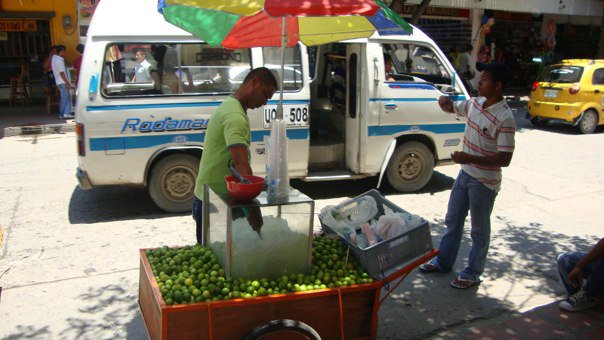Colombia has its own charms, including many charming everyday expressions, some of which initially befuddled me, and now all of which charm in the extreme. I get the impression that these are Colombianisms, but if any of these expressions are common in other hispanohablante countries, please let me know in the comments.
 "A la orden." When I first arrived in Colombia, bleary-eyed from more than 24 hours of air travel from Rio, I took a walk around the colorful streets of Santa Marta, a Caribbean hub of a town near some of Colombia's most beautiful beaches in Parque Nacional Tayrona. The streets were bleached with sun and heat and dotted with fresh lemonade stands. And everywhere I walked, people hawking electronics, shoes, hats called out "A la orden."
"A la orden." When I first arrived in Colombia, bleary-eyed from more than 24 hours of air travel from Rio, I took a walk around the colorful streets of Santa Marta, a Caribbean hub of a town near some of Colombia's most beautiful beaches in Parque Nacional Tayrona. The streets were bleached with sun and heat and dotted with fresh lemonade stands. And everywhere I walked, people hawking electronics, shoes, hats called out "A la orden."
Later in Taganga, a little fishing village, every interaction with a street vendor began and ended with "A la orden." I had no clue what these three words meant. Was I supposed to say "A la orden" in return? None of the gringo tourists knew. I asked a street vendor who sold me an arepa, a Colombian soft grilled pancakey taco (quite delicious), what "a la orden" meant. She told me "OK." I believed her. Later I learned that was not exactly right.
According to Google Translate, "a la orden" literally means "to order," but a more accurate translation is "at your service." It's been amusing to spend time in a country where people are calling out all the time that they are at your beck and call. The "a la orden" thing seems like a societal tic, like people can't control themselves from saying it constantly.
Is the service really that great in Colombia? It's OK. I don't think it's quite at American standards. For example, a clerk at a corner store won't initiate contact here, you have to push a bit to pay. In general, they are not totally attentive in the way that American might expect service to be. But the service is probably better than Brazil's, and what's more, it is often delivered "con mucho gusto."
"Con mucho gusto." Let's say that you give me a delicious fruit, say maracuya, or passion fruit. And I thank you, saying "gracias." Instead of saying "de nada" in response Colombians say "con mucho gusto." That could be translated in French as "avec plaisir," or in English as "with pleasure."
It is a pleasure in itself to have people acknowledge their service or gifts with "con mucho gusto." It makes you realize how weak "You're welcome" is as a response to "thank you." "Con mucho gusto" feels like a real affirmation of life! I loved making this coffee for you, or giving you this dance class. I offer it to you with "mucho gusto"!
People also say "mucho gusto" when they meet new people. It's used to indicate, "pleasure to meet you," the equivalent of the French "enchante" or Portuguese "prazer."
Listo! One of the most interesting things about absorbing a new everyday language is learning how to say OK, and to replace the natural American-English instinct to say "OK" in agreement. Colombians and Brazilians say "OK" to some extent but it's not the most natural way of indicating agreement.
Listo is really a fantastic word. Literally it means ready, as in, I am lista to go out to the salsateca tonight in Cali. But it also means "OK." If we negotiate a price and I agree, I can say "listo!" Used with a question mark at the end it is the all-purpose way to ask if someone understands something, or if there is agreement. "Listo?" "Listo!"
"Listo" reminds me a little bit of "ta" in Portuguese. "Ta" is a shorter version of "esta," a conjugation of the verb to be. It's a way to say OK, or yes. If you ask me to stop and wait for you while you take a picture, I can say "ta!" It's so staccato and simple and cute--I loved the process of replacing "OK" with "ta!" and "listo."
Sasha Cagen is traveling through Brazil, Colombia, and Argentina in 2010. Read more of her adventures and observations at quirkyalone.net.